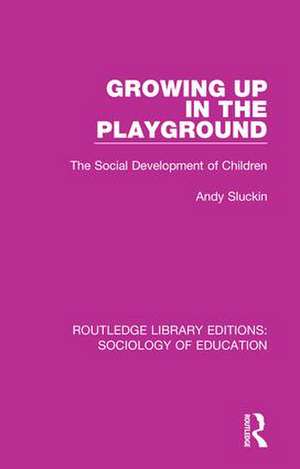Growing up in the Playground: The Social Development of Children: Routledge Library Editions: Sociology of Education
Autor Andy Sluckinen Limba Engleză Paperback – 19 sep 2018
| Toate formatele și edițiile | Preț | Express |
|---|---|---|
| Paperback (1) | 309.69 lei 6-8 săpt. | |
| Taylor & Francis – 19 sep 2018 | 309.69 lei 6-8 săpt. | |
| Hardback (1) | 782.44 lei 6-8 săpt. | |
| Taylor & Francis – 28 apr 2017 | 782.44 lei 6-8 săpt. |
Din seria Routledge Library Editions: Sociology of Education
-
 Preț: 245.94 lei
Preț: 245.94 lei - 34%
 Preț: 22002.31 lei
Preț: 22002.31 lei - 18%
 Preț: 782.44 lei
Preț: 782.44 lei - 31%
 Preț: 473.94 lei
Preț: 473.94 lei - 15%
 Preț: 613.49 lei
Preț: 613.49 lei - 18%
 Preț: 891.36 lei
Preț: 891.36 lei - 26%
 Preț: 625.03 lei
Preț: 625.03 lei -
 Preț: 309.69 lei
Preț: 309.69 lei - 18%
 Preț: 782.44 lei
Preț: 782.44 lei - 15%
 Preț: 556.77 lei
Preț: 556.77 lei - 18%
 Preț: 782.44 lei
Preț: 782.44 lei - 34%
 Preț: 680.73 lei
Preț: 680.73 lei - 31%
 Preț: 473.94 lei
Preț: 473.94 lei - 18%
 Preț: 782.44 lei
Preț: 782.44 lei - 18%
 Preț: 782.44 lei
Preț: 782.44 lei - 18%
 Preț: 782.44 lei
Preț: 782.44 lei - 18%
 Preț: 782.44 lei
Preț: 782.44 lei - 18%
 Preț: 782.44 lei
Preț: 782.44 lei - 18%
 Preț: 782.44 lei
Preț: 782.44 lei - 18%
 Preț: 891.36 lei
Preț: 891.36 lei - 18%
 Preț: 782.44 lei
Preț: 782.44 lei - 18%
 Preț: 782.44 lei
Preț: 782.44 lei - 34%
 Preț: 680.73 lei
Preț: 680.73 lei - 18%
 Preț: 1284.38 lei
Preț: 1284.38 lei - 18%
 Preț: 782.44 lei
Preț: 782.44 lei - 18%
 Preț: 782.44 lei
Preț: 782.44 lei - 18%
 Preț: 891.36 lei
Preț: 891.36 lei - 18%
 Preț: 782.44 lei
Preț: 782.44 lei - 18%
 Preț: 782.44 lei
Preț: 782.44 lei - 25%
 Preț: 597.20 lei
Preț: 597.20 lei - 18%
 Preț: 782.44 lei
Preț: 782.44 lei - 18%
 Preț: 782.44 lei
Preț: 782.44 lei - 18%
 Preț: 891.36 lei
Preț: 891.36 lei - 18%
 Preț: 782.44 lei
Preț: 782.44 lei - 34%
 Preț: 680.73 lei
Preț: 680.73 lei - 34%
 Preț: 625.03 lei
Preț: 625.03 lei - 26%
 Preț: 680.73 lei
Preț: 680.73 lei - 23%
 Preț: 456.63 lei
Preț: 456.63 lei - 18%
 Preț: 782.44 lei
Preț: 782.44 lei - 18%
 Preț: 782.44 lei
Preț: 782.44 lei - 18%
 Preț: 782.44 lei
Preț: 782.44 lei - 26%
 Preț: 625.03 lei
Preț: 625.03 lei - 18%
 Preț: 782.44 lei
Preț: 782.44 lei - 18%
 Preț: 891.36 lei
Preț: 891.36 lei - 15%
 Preț: 585.27 lei
Preț: 585.27 lei - 18%
 Preț: 782.44 lei
Preț: 782.44 lei - 18%
 Preț: 782.44 lei
Preț: 782.44 lei - 34%
 Preț: 625.03 lei
Preț: 625.03 lei
Preț: 309.69 lei
Nou
Puncte Express: 465
Preț estimativ în valută:
59.26€ • 62.03$ • 49.32£
59.26€ • 62.03$ • 49.32£
Carte tipărită la comandă
Livrare economică 01-15 aprilie
Preluare comenzi: 021 569.72.76
Specificații
ISBN-13: 9781138629363
ISBN-10: 1138629367
Pagini: 142
Dimensiuni: 138 x 216 x 8 mm
Greutate: 0.45 kg
Ediția:1
Editura: Taylor & Francis
Colecția Routledge
Seria Routledge Library Editions: Sociology of Education
Locul publicării:Oxford, United Kingdom
ISBN-10: 1138629367
Pagini: 142
Dimensiuni: 138 x 216 x 8 mm
Greutate: 0.45 kg
Ediția:1
Editura: Taylor & Francis
Colecția Routledge
Seria Routledge Library Editions: Sociology of Education
Locul publicării:Oxford, United Kingdom
Public țintă
General, Postgraduate, and UndergraduateCuprins
General Editor’s Preface; Acknowledgements; 1. ‘What do you think playtime is for?’ 2. ‘Hey Mister, can I be in your book?’ 3. ‘Eeny, meany, macka, racka…’ 4. ‘Bagsee no bagsee’ 5. ‘Whose game is it, can I play?’ 6. ‘I’m your friend, let me have some’ 7. ‘Neill’s the boss of the playground 8. ‘That’s how we learn’; Notes; Bibliography; Appendix
Descriere
First published in 1981, this work is based on the author’s research in the playgrounds of two Oxford schools. It describes the order amongst the apparent chaos by relating the playtime activities – the games, rhymes and taunts of five-to-ten-year-olds in first and middle schools – to children’s goals, problems and solutions. It shows how children learn and display in the playground a remarkably complex set of social skills and the study clearly demonstrates the importance of playtime for preparing a child to cope in the adult world.
